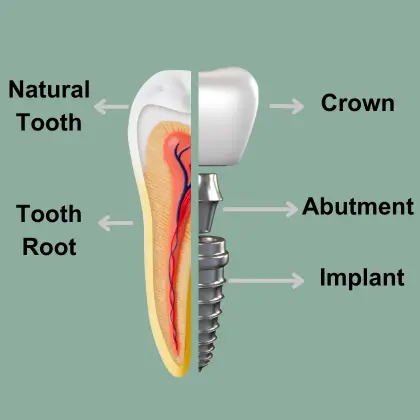Dental Implant Turkey, Izmir: Comprehensive Guide
Whether you want to replace your missing teeth or your existing dentures with a more reliable solution, dental implants offer a long-term and natural solution. In addition to improving your ability to eat and your self-confidence, dental implants prevent problems caused by missing teeth, such as loss of bone density and lack of support from other teeth.

What is a Dental Implant?
A dental implant is a prosthesis that replaces missing tooth roots as a titanium screw. Once this implant is placed directly into the jawbone, it fuses with the bone and is held firmly in place. The denture (crown) placed over it is custom-designed to match the colour and shape of your existing teeth, thus providing you with a fixed solution and a natural smile.
Dental implants look and function like natural teeth, and with proper care and attention, they can last for many years. This way, you can chew food and smile comfortably while maintaining your overall oral health by preventing problems such as bone density loss.
Dental Implant Procedure

Initial Consultation
The first step in getting dental implants is to come to our clinic for a consultation. Everyone's implant treatment process is unique. We can discuss your options and determine the right treatment for you.
We also offer telephone consultations, so you can speak to our treatment coordinator to learn more about implant treatment before visiting a dentist.
During your consultation, your dentist or treatment coordinator will discuss what you aim for due to treatment and your medical history. After the necessary examinations, your needs will be determined, and they can estimate costs. You will also have the opportunity to ask any questions about the treatment.
Planning and examinations
After the initial consultation, a clinical assessment is needed to determine your dental implant suitability and provide you with the most appropriate solution. During this assessment process, your dentist will take x-rays of your mouth and create a model of your existing teeth. These steps are important to check the suitability of the implants and determine their correct position.
In addition, your dentist may recommend a CBCT scan to determine bone density. If necessary, additional procedures such as bone grafting or sinus lifting may be required before the dental implants can be placed.
Before, during and after the procedure, they will discuss the details of the process with you and also provide information about the cost of treatment. If you decide to proceed, you will be presented with a treatment plan and asked to confirm it.
All-on-4 (see) or All-on-6 dental implants (see) may be a good option for you in case of complete edentulism or loss of function of the majority of teeth.
Dental Implant Placement
The dental implant placement process is quite simple and painless. First, you will relax in our practice under local anaesthetic, so you will not feel any pain during the procedure. If you have concerns, we can offer options such as sedation to provide additional comfort.
During the procedure, your gum will be gently lifted, and a small hole will be drilled into your jawbone. A titanium dental implant will be inserted into this hole. The implant will fuse with your jawbone to form a strong foundation on which a highly durable prosthetic tooth will be fitted.
The placement of the dental implant usually takes a short time, and pain or discomfort is minimal. Once the procedure is complete, your gum is usually closed with sutures, but this is not always necessary.
In some cases, we can also fit you with temporary teeth to speed up the healing process of the dental implant. This way, you can continue your normal daily activities and maintain your smile until your implant has fully healed.
We are here to provide you with the best experience every step of the way. If you have any questions or concerns about dental implant treatment, please do not hesitate to contact us. Your health and satisfaction is our top priority.
Fitting permanent denture
After the dental implant placement process is completed, you may need to wait a period, usually between 3 and 6 months, for the implant to fully fuse with the jawbone. During this time, the implant will form a solid bond with the bone and provide a strong foundation.
Once the implant has fully healed, your permanent denture or teeth can be fitted. At this stage, we will insert your specially prepared teeth using an abutment placed over the implant. The abutment is like a small post placed on top of the implant, supporting the artificial tooth and providing a firm hold.
In the next step, we will place your custom-made prosthetic teeth. These teeth will be specially designed and manufactured to match your natural teeth' size, shape and colour. This will preserve the natural appearance of your smile and give you a smile that gives you confidence.
Fitting prosthetic teeth is usually completed quickly, and pain or discomfort is minimal. Our priority is to make you feel comfortable and relaxed during this process.
Aftercare

The dental implant procedure has been completed and now it is time to take care of your implant, which is an important step to ensure its longevity and health. You must follow a regular and effective care routine to keep your implant healthy long-term. Here are some tips to optimise post-implant care:
Use Soft Brush and Floss: Use a soft-bristled toothbrush and floss to clean the gums around your dental implant. This prevents plaque build-up and reduces the risk of infection.
Proper Nutrition: Adopt a balanced diet to speed up healing and strengthen your dental implant. Especially consuming protein-rich foods will support the healing process.
Avoid Smoking and Alcohol Consumption: Smoking and excessive alcohol consumption can prevent the dental implant from healing successfully. Therefore, if possible, do not smoke and limit alcohol consumption.
Dentist Checks: Make regular visits to your dentist to check your dental implant's health and condition regularly. These checks ensure the longevity of your implant by providing early diagnosis and intervention.
Use Oral Care Products: Optimise your oral hygiene using oral care products recommended by your dentist. This will protect your gum health and support the long-term success of your implant.
The health and durability of your dental implant are directly related to a regular and effective maintenance routine. By following the above tips, you can ensure your implant's longevity and that it will serve you safely for many years to come.
How much are dental implants?
Dental implants cost UK
The price of dental implants in the UK can vary depending on several factors. A dental implant usually ranges between £2000 and £3000. However, several important factors affect the price.
These include the type and quality of the implant, the surgeon's experience, the materials used, and the clinic's location performing the treatment. For example, prices can often be higher when premium materials and a more experienced surgeon are used.
In addition, the complexity of the treatment can also affect the cost. In some cases, bone grafting or additional surgical procedures may be required, which can also increase the cost. The length of the treatment process and the required follow-up visits are other factors that affect the price.
Finally, insurance coverage can also affect the price. Some health insurance plans may cover dental implants, while others may not or only partially. Therefore, it is important to check your insurance plan before treatment.
In general, the price of dental implants varies depending on the clinic performing the treatment, the materials used, the surgeon's experience and the treatment's complexity. Therefore, consulting a dentist to get a personalised quote is important.
Can I get dental implant treatment on the NHS?
While dental implant treatment is primarily offered through private practices and isn't commonly covered by the NHS, there are exceptions. For instance, individuals who have lost teeth due to severe accidents or mouth cancer may qualify for NHS treatment.
Can you get free dental implants in the UK?
Although the NHS generally doesn't cover dental implants, reimbursement may be possible for patients unable to wear dentures, those affected by facial or dental damage, or individuals with oral cancer or accidents resulting in tooth loss. Additionally, NHS support may extend to those with congenital tooth abnormalities, genetic conditions, or tooth loss due to medical treatments.
Dental Implants Turkey Cost
The price of dental implants in Turkey can vary depending on various factors. Generally, the cost of dental implants in Turkey varies between £400 and £650 per implant. However, various factors such as the complexity of the procedure, the number of implants needed, the quality of the materials used and the dentist's expertise can affect this price.
In general, dental implant costs in Turkey are more affordable than in the UK and many Western countries. Patients should consult their dentist for a personalised quote based on their needs and circumstances.
What are the Benefits of Dental Implants?
Improving aesthetic appearance: Dental implant improves the aesthetic appearance by replacing missing teeth with natural-looking teeth.
Improving chewing functions: Dental implant improves chewing functions by replacing missing teeth.
Protecting gum health: Dental implants reduce the risk of gum diseases by adhering to the jawbone.
Correction of speech disorders: Dental implants can help correct some speech disorders.
Who Can Get Dental Implant?
People with missing teeth: Dental implants can be applied to people who are missing a single tooth, a few teeth, or all of their teeth.
People with gum disease: People with gum disease may be suitable for dental implant treatment. However, implant treatment should be applied after gum disease is controlled.
People undergoing cancer treatment: In people receiving cancer treatment, implant treatment can be applied after chemotherapy or radiation therapy that causes tooth loss.
Dental Implant Care
Dental implant require care like natural teeth. The gum area around dental implants should be brushed and flossed regularly. Additionally, annual dentist checks should not be neglected.
As Roselle Dent Dental Clinic, we offer modern and effective solutions in our dental implant treatments. By creating a customized treatment plan for each patient, we aim to bring your smile and health back.
